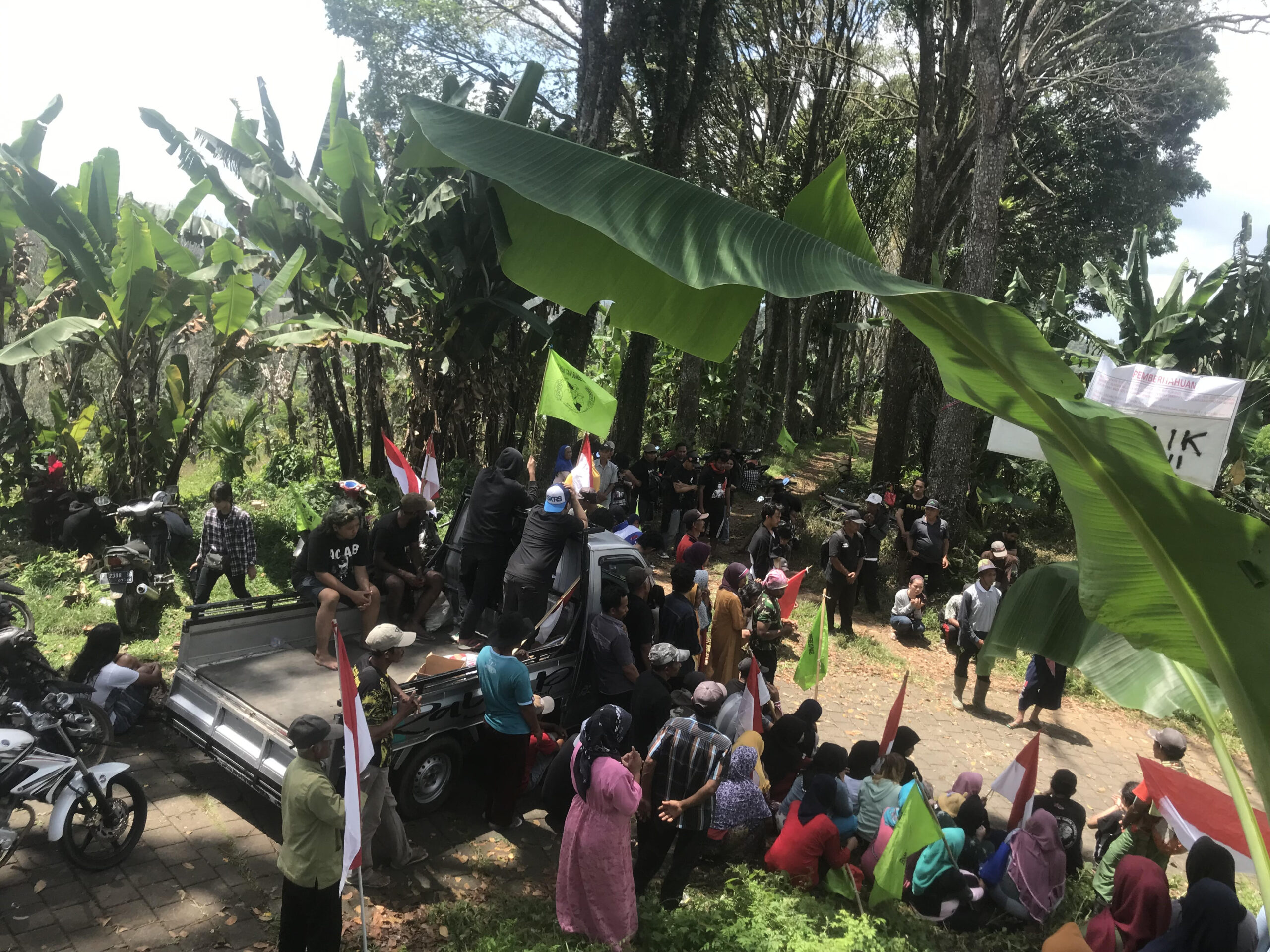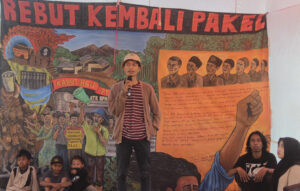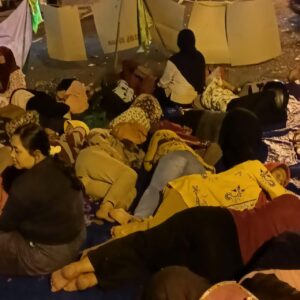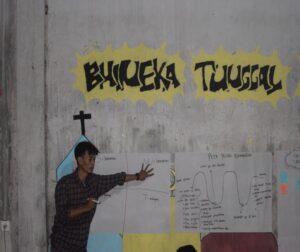
Taufiqurochim, or Taufiq, is the Coordinator of Agrarian Issues at Lembaga Bantuan Hukum-Surabaya (LBH-Surabaya), the provincial chapter of the national organization Indonesian Legal Aid Foundation. Taufiq shares his journey and what inspires him, along with the important work LBH does in the field of land and environmental justice.

Taufiqurochim at a community meeting.
Since I was a 6th semester university student, I have been involved in advocating for the urban poor living in Keputih Tegal Timur Baru (KTTB) in East Java, who were being evicted from their living areas by the Surabaya City government. At that time, I, along with my colleagues and residents, did everything in our power to fight the arbitrary eviction plan. When community members in the Lamongan Regency area were evicted from their homes, we put up 6-meter tents where we stayed the night. In addition, during my time as a student, I was also involved in advocacy efforts against community land seizures near the Sepat Reservoir in 2018.
At that time, I felt angry and annoyed to see poor people being mistreated by the government. That experience made me realize that my confidence in the government is zero. I thought that no one can save us, but only we can save ourselves; even then in my mind, I said: “If only I were [in control of] the law, I would give appropriate punishment to those whose work likes to displace people’s living space.
“In this climate of closing civic space, I realized that our rights weren’t guaranteed, and that no one has the right to imprison farmers and environmental warriors for defending their living space.”
I then joined Yayasan Lembaga Bantuan Hukum Indonesia – Lembaga Bantuan Hukum Surabaya (YLBHI-LBH Surabaya), the provincial chapter of YLBHI. During this time, I was interested in working on agrarian issues in Surabaya. I began to learn deeply about agrarian conflict resolution in East Java, and I often saw unfair and discriminatory behaviors towards landless farmers. In addition to litigation, our work at that time was to be a critical partner of citizens and farmers, facilitating and organizing them to be empowered and to fight for their rights. In certain circumstances too, we need to change our position from being a partner with farmers to empowering them and daring them to fight for their rights.
As I worked more closely with farmers, I spent less time in the office. I would constantly be in the villages, listening to the farmers’ stories. At times, I stayed with community members for weeks, or spent days with them to understand the various aspects of agrarian conflict in the community. The spirit I brought with me to the village was one of solidarity.

Solidarity action of Pakel villagers in front of the Banyuwangi District Court until late at night.
There was a moment – when I joined the struggle of Pakel Farmers to reclaim their land, which was being seized by private plantations and state companies.
I appreciate the persistence of the Pakel Farmers. Since 1925, residents of Pakel Village have been suing over land inequality. Their struggle dates back to the Dutch East Indies-Japan Colonial Era, the Old Order Era, the New Order Era, until the Reformasi. Even today, the residents of Pakel Village are persistent in fighting the judiciary even though their journey is always haunted by acts of violence, intimidation and criminalization from those in power.
Recently, three Pakel farmers were criminalized on ‘fake news’ charges, allegedly causing trouble in the community. They were charged on September 24, 2020, in conjunction with the National Farmers Day. The three farmers together with more than 2,000 residents planted crops, therefore pausing the production granary of PT. Bumi Sari, a plantation company. In this case, the law was used by the police to silence the farmers’ struggle. As a response, the Advocacy Working Team for Agrarian Sovereignty and Natural Resources (TeKAD GARUDA), which I was a part of, mobilized public solidarity. We collected a total of 1,008 case suspension letters from citizens, academics, and community organizations. However, the demand for the farmers’ release was not considered by law enforcement at all.
We then set up tents in front of the Banyuwangi District Court to protest. Earlier in 2023, other groups organized a hunger strike to similarly demand the release of the three farmers. The Pakel Farmers’ struggle added much spirit in my own journey to fight for the rights of the poor.

Taufiq facilitating a meeting.
When I chose to step foot in the area of land conflicts, I realized the consequences, challenges, and difficulties I will face.
Every time I go to a remote village, I often encounter problems between poor people and the law. They are helpless, resigned and confused about how to make a legal defense. When they need legal assistance or services from professionals, they are often only used for their property. In traditional cases, the resolution process can take decades. Many lawyers have become solely legal practitioners or paid advocates who only handle mega project cases. Because of this reality, empathy is what keeps me going. More than being a professional advocate, participating in the struggle for justice with the poor and marginalized is what inspires me and keeps me going.